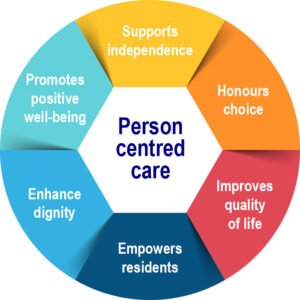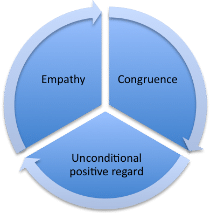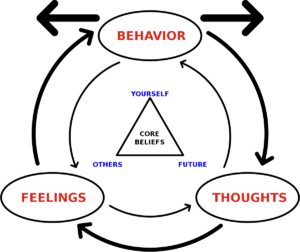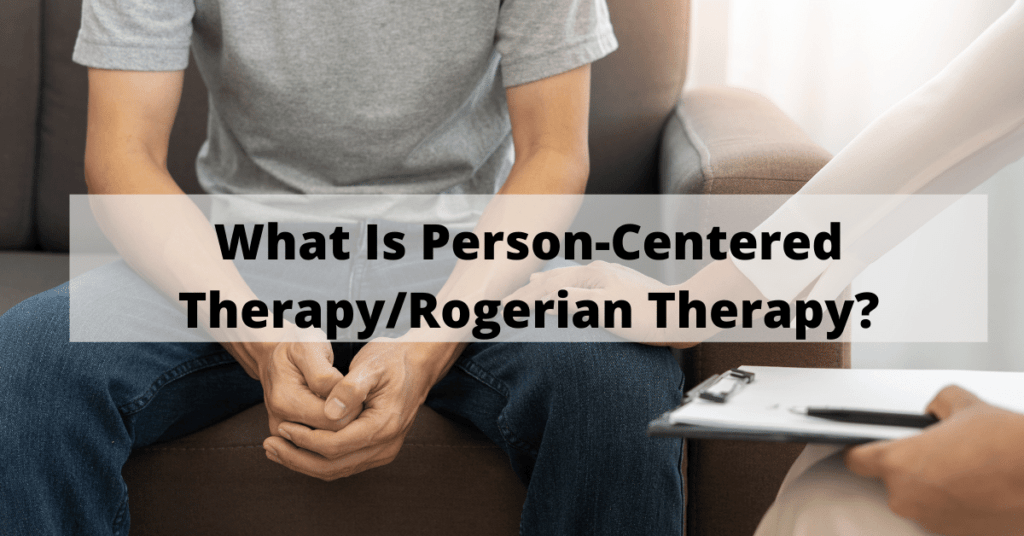Contents
- 1 What Is Person-Centered Therapy/Rogerian Therapy?
- 2 Benefits Of Person-centered Approach To Counseling
- 3 How Person-Centered Therapy Help You In Your Life?
- 4 How Does Person-Centered Therapy work?
- 5 How Is It Best Used?
- 6 How Person-Centered Therapy Help You In Your Life?
- 7 Person-centered Therapy Vs Other Therapies
- 8 Who Provides Person-Centered Therapy?
- 9 Conclusion
What Is Person-Centered Therapy/Rogerian Therapy?

Person-centered therapy is a counseling approach that emphasizes the importance of the client’s strengths and perceptions about him or herself. It places a focus on how the client’s thoughts and feelings affect their actions. More specifically, person-centered therapy is grounded in Carl Rogers’ theory of “personhood” which holds that people are inherently good and that they can use their own experiences to reach their full potential.
Both person-centered therapy and Rogerian therapy are grounded in Carl Rogers’ theory of “personhood” which holds that people are inherently good. “Personhood” is also sometimes called the “self-actualizing tendency”. In Rogers’ view, humans naturally move progressively towards self-actualization as they learn to trust their own perceptions and feelings.
Rogers had a pragmatic focus on an individual’s current state and how it could be improved rather than on exploring childhood experiences or early development. He believed that psychotherapy should help an individual develop an accurate conception of him or herself and of the world, and improve his or her capacity for making more satisfying choices.
Benefits Of Person-centered Approach To Counseling
Person-centered therapy can be very helpful, just like other forms of counseling. It is most beneficial for people who want to find their purpose and meaning in life, people who are experiencing anxiety or depression, and those who want to learn how to relate to others more effectively.
person-centered therapy produces realizable accomplishments that are based on what the client can do, rather than attributing change solely to the counselor. This therapeutic approach also emphasizes the person’s potential for self-growth.

- Help people with low self-esteem navigate their way through life
- Encourage clients to look at the ways in which they are active participants in creating their own lives. It is based on the assumption that everyone has what it takes to be successful and that all people have the potential to achieve their greatest fulfillment by making choices from a position of self-aware
- Allows for exploration of how they have allowed others to define them, as well as how they can define themselves in ways that are more empowering.
Anybody can benefit from person-centered therapy. It is most beneficial for people who want to find their purpose and meaning in life. People who are experiencing anxiety or depression, and those who want to learn how to relate to others more effectively. Anybody with low self-esteem would also benefit from person-centered therapy. Because it allows them to explore how they have allowed others to define them. As well as how they can define themselves in ways that are more empowering.
How Person-Centered Therapy Help You In Your Life?
Person-centered therapy, like other forms of counseling, can be very helpful to individuals who are dealing with issues that are causing them distress. It is likely the most beneficial for people who want to find their purpose and meaning in life. It can also help those experiencing anxiety or depression, as well as those who want to learn how to relate to others more effectively.
Person-centered therapy can also help people with low self-esteem navigate their way through life. Because it encourages them to look at the ways in which they are active participants in creating their own lives. It is based on the assumption that everyone has what it takes to be successful and that all people have the potential to achieve their greatest fulfillment by making choices from a position of self-awareness. It also creates the opportunity for a person with low self-esteem to explore how they have allowed others to define them, as well as how they can define themselves in ways that are more empowering.
How Does Person-Centered Therapy work?
The ultimate goal of person-centered therapy is to empower the client with the sense that they alone hold the key to their happiness and fulfillment in life. This enables them to live a more self-determined life.

- The client must remain an active participant in the counseling sessions and have a strong belief that change is possible for them via self-discovery
- Person-centered therapy focuses on the client’s feelings, experiences, and thoughts as the pathways to individual growth
- It takes time, hard work, and dedication throughout the process of person-centered counseling
- The client must develop their ability to be aware of their thinking, feelings, and actions in the present moment
- Person-centered therapy is focused on what is possible
- Individual needs are met through creating goals that the client can achieve based on what they can do, rather than attributing change solely to the counselor or therapist
- Person-centered therapy helps clients achieve their goals as they define them
- The focus is on the individual’s internal experiences, rather than on the outside world
- In person-centered therapy, the therapist’s goal is to help change thought patterns and behaviors
- When a person becomes more conscious of their thoughts and feelings. They are able to make their own choices about how they want to act
Person-centered therapy helps clients look at the ways in which they are active participants in creating their own lives. They have what it takes to be successful, and all people have the potential to achieve their greatest fulfillment by making choices from a position of self-awareness.
Self-direction is important in person-centered therapy. People are seen as sources of wisdom and guidance for themselves, not just empty vessels that need someone to tell them what they are feeling.
How Is It Best Used?
The importance of person-centered therapy is to allow the client to understand themselves and their experience. With the focus on the client’s perspective, they will be more open to change and make adjustments. Therapists can encourage clients by using empathy; this is done by listening and validating the client’s feelings, thoughts, and views.
Client-centered therapy is best used with people who are ‘well’ and want to maintain their health. The therapist pays attention and understands the client’s experiences with others including family members or friends. This can be helpful for someone who isn’t ready for counseling but still seeks guidance.
Therapist-Client Psychological Contact

It is very important for a client to feel connected with the therapist, so they can open up easily. The therapist reflects back on the client’s feelings. As it encourages the client to feel more understood and validated.
Empathic Understanding
The importance of this technique is for clients to be able to explain their experiences from different perspectives. The use of empathy allows for a better understanding of how one view themselves, others, and the world.
Reflection
Reflection is a method of asking questions for clients to gain insight into their own experiences. It allows people to recognize something they never considered before and provides further clarity about what one may be experiencing in life.
Active Listening
Listening is seen as an action rather than just hearing. The therapist passively listens first, then actively participates in the discussion. Active listening is beneficial because it further enhances the client’s thoughts and ideas which can lead to more insight into themselves.
Validation
Validation offers comfort for people experiencing hardships. It recognizes that people are feeling a certain way, whether it be happiness or sadness, by acknowledging the feelings.
Supporting Emotional Expression

The therapist helps clients gain self-awareness by supporting their emotional expressions and encouraging them to share any feelings or emotions they may be experiencing throughout therapy sessions. This allows for a more in-depth understanding of oneself and how one views others in relationships. It provides guidance on constructing healthy relationships with others.
Supportive Environment
This method of therapy allows for a supportive and non-judgmental environment to help people make changes in their lives. The therapist offers support, information, and the tools necessary for change which helps them feel more comfortable with themselves and others.
Therapist as a Model
The therapist wants to be a model for how people can learn to express themselves and encourage others. Through this, the therapist is demonstrating their own ability to handle different emotions which offers encouragement for clients who may feel uncomfortable with expressing themselves outwardly/verbally.
Development of Coping Skills
The therapist helps people develop skills that they didn’t know they had. This allows the client to become more confident and comfortable with themselves. As they learn how to deal with troubling situations such as stress, fear, and anger.
Encourage Future Goals
Therapists encourage clients to think about what they want their future to be like or what they would ideally like to change in their lives. It gives people the motivation to do what they really want in life. Its purpose is to help people achieve their goals as they define them. Person-centered therapy allows for exploration of how the client has allowed others to define them, as well as how they can define themselves in ways that are more empowering. Person-centered therapy is not a quick fix – it takes hard work and time.
How Person-Centered Therapy Help You In Your Life?
 Person-centered therapy, like other forms of counseling, can be very helpful to individuals who are dealing with issues that are causing them distress. It is likely the most beneficial for people who want to find their purpose and meaning in life. It can also help those experiencing anxiety or depression, as well as those who want to learn how to relate to others more effectively.
Person-centered therapy, like other forms of counseling, can be very helpful to individuals who are dealing with issues that are causing them distress. It is likely the most beneficial for people who want to find their purpose and meaning in life. It can also help those experiencing anxiety or depression, as well as those who want to learn how to relate to others more effectively.
Person-centered therapy can also help people with low self-esteem navigate their way through life. Because it encourages them to look at the ways in which they are active participants in creating their own lives. It is based on the assumption that everyone has what it takes to be successful and that all people have the potential to achieve their greatest fulfillment by making choices from a position of self-awareness. It also creates the opportunity for a person with low self-esteem to explore how they have allowed others to define them. As well as how they can define themselves in ways that are more empowering.
Person-centered Therapy Vs Other Therapies
Person-centered therapy is different from some other types of counseling, such as cognitive-behavioral therapy and psychoanalysis. While person-centered therapists can use these other approaches in their work with clients. They focus on creating goals that the client can achieve based on what they can do rather than attributing change solely to the counselor or therapist. Person-centered therapy also emphasizes the client’s potential for self-growth.
CBT
 In cognitive-behavioral therapy, the therapist’s goal is to help change thought patterns and behaviors. In person-centered therapy, clients are encouraged to look at the ways in which they are active participants in creating their own lives; they have what it takes to be successful, and all people have the potential to achieve their greatest fulfillment by making choices from a position of self-awareness. The focus of person-centered therapy is on the individual’s internal experiences, rather than on the outside world.
In cognitive-behavioral therapy, the therapist’s goal is to help change thought patterns and behaviors. In person-centered therapy, clients are encouraged to look at the ways in which they are active participants in creating their own lives; they have what it takes to be successful, and all people have the potential to achieve their greatest fulfillment by making choices from a position of self-awareness. The focus of person-centered therapy is on the individual’s internal experiences, rather than on the outside world.
Person-Centered Therapy allows for exploration of how they have allowed others to define them, as well as how they can define themselves in ways that are more empowering.
It is based on the assumption that everyone has what it takes to be successful and that all people have the potential to achieve their greatest fulfillment by making choices from a position of self-awareness. Person-centered therapists believe that life is inherently meaningful, which means even in suffering, there can be growth (even though finding meaning in suffering may take time). Person-centered therapy focuses on the client’s feelings, experiences, and thoughts as the pathways to individual growth. Most importantly, its purpose is to help people achieve their goals as they define them.
It is important for both therapists and clients to know that person-centered therapy is not a quick fix – it takes hard work and time. Working through difficulties and life changes takes time, and with person-centered therapy, there is no set timeline for how long it will take.
Who Provides Person-Centered Therapy?
There are many different kinds of therapists who use a person-centered approach to counseling. These include psychologists, counselors, social workers, family therapists, marriage and family therapists, and…
Qualified person-centered therapists have a master’s degree in counseling or related field with at least two years of supervised practice. They also need to complete 60 hours of continuing education per year.
There is no formal certification for person-centered therapy. But there are codes of ethics that practitioners must follow.
Conclusion
Person-centered therapy is a therapeutic approach that focuses on the present situation of the person, their feelings, and thoughts. The therapist seeks to find out how they are feeling in this moment; what they want; what brings them joy or pain; and why. This allows for an individualized treatment plan based on each client’s needs rather than anyone’s diagnosis. It is based on the assumption that everyone has what it takes to be successful. And that all people have the potential to achieve their greatest fulfillment by making choices from a position of self-awareness.
Some people may experience relief from symptoms without even realizing it when somebody listens to them with empathy and compassion. Others might take time before making changes but ultimately see long-term benefits as well as short-term rewards. These techniques promote self-awareness leads to self-care. If you are looking for a therapist for person-centered therapy, contact our team today. And get the treatment according to your convenience.
If you are looking for affordable Online Counseling MantraCare can help: Book a trial therapy session


